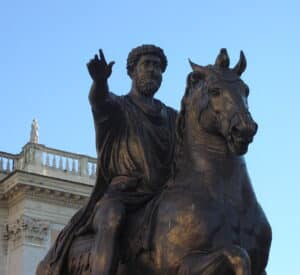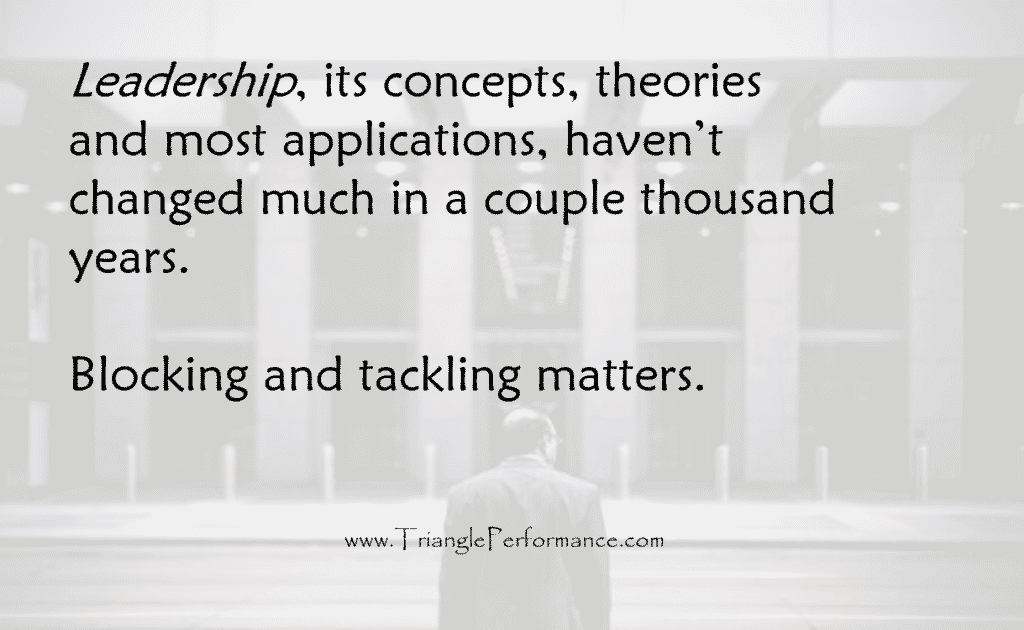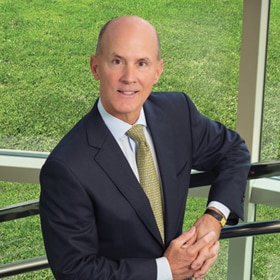Leadership Leader

A Triangle Throwback – way, waaay back.
We’ve decided to showcase Marcus Aurelius, Emperor of Rome and General Plunderer, as this month’s Leader.
Not because he was a “good guy,” though he was considered the last of the Five Good Emperors, a time period thought to be ruled by absolute power, under the guidance of virtue and wisdom. Sorta like telling an employee you can fire them for any reason, but you won’t because you’re just not that kind of jerk…
No, we selected Marcus because of his personal leadership style and philosophy. First, he was good at leading an army. These were not the days when leading an army happened in monitor-laden control room thousands of miles away. Leadership during Marcus’ time was a little more hands-on than that. He defeated multiple armies that threatened his empire, many of them at the same time. Most powerful man in the world, but heralded as a noble leader with moral character. A good all-around Joe.

His death in 180 A.D. commonly marks the beginning of the end—the Fall of the Roman Empire.
And more importantly, at least for our discussion today, were his personal writings where he recorded his private notes and thoughts on many things, including human behavior, influence and leadership. The writings have been combined into a loose publication called Meditations. Bluntly, these works are fairly badass in the “quotable” department. For example, these three are our favorites:
“…how we learn; by looking at each thing, both the parts and whole. Keeping in mind that none of them interpret how we perceive it.”
Today’s translation: Perception is reality for those who perceive. Facts are facts, data are data; what we do with them and what they mean depends on our perceptions. And don’t forget—others are doing the same thing!
“…you’ve made enough mistakes yourself. You’re just like them.”
Today’s translation. You’re not all that. Humility is a good thing. Ego can cripple a senior leader; remember that just because you are called to make big, bad, difficult decisions, you are no better or worse than anyone else. Bigger titles don’t equate to more self-worth.
“When you lose your temper or even feel irritated: [remember] that human life is very short. Before long all of us will be laid out side by side.”
Today’s translation: In the big scheme, this isn’t. Most things aren’t a big deal. Bad decisions can be remade, and calmness is a virtue for leaders. It’s not the end of the world. As Bill from my men’s group is fond of saying, “The death rate among humans is 100%.”
Something we preach at Triangle Performance is evidenced in this article:

People are still people; human behavior is a constant.
Marcus was a leader; a pretty damned good one, especially for the times. If you would like to read some more on his Meditations writings, see Marcus Aurelius’ 10 Rules for an Exceptional Leader.
All in all, a no brainer for our Leadership Leader for the month, though saying “for the month” may be a bit disingenuous…
Leadership Milquetoast
Leadership Milquetoast
Our love-hate relationship with United Airlines continues. We probably look like some lame politician during an election cycle, flip-flopping every month or so. Like a politician, then, we’ll just say we aren’t flip-flopping, we’re just “modifying our position.”
To wit: United Airlines CEO Oscar Muñoz appeared on CNBC and said something quite moving about leadership, specifically about rules. He confessed that United had lots of rules. Many of those undoubtedly idiotic. Then, in a bizarre twist that made me think an alien had taken over his body, he actually said, “They don’t have to be rules.”
What?? You mean that self-imposed rules created by a manager to deal with a one-off situation don’t automatically morph into statutory law of the land?? How can this be?
So, let’s be fair. The comment was a stellar one, had it been either spoken by someone not trying all that’s holy to rebuild brand credibility, or had it been accompanied by a believable commitment to change the blindingly asinine way that rules at United are enforced today. Given either of those scenarios, the words may have been like music.

He didn’t help himself as he moved forward: Muñoz then said that instead of being called rules, “…they can [just] be policies or procedures that can be adapted for the moment.”
Our Triangle Bullshit Translator deciphered that sentence; it’s code-word for “we’ll do whatever we want, when we want, based on the particular whims of the United employee in that moment.”
Why doesn’t that make me feel better?
So, here we are. To be fair, Oscar Muñoz did say a couple of things that are sound, forward-thinking leadership concepts.
- We shouldn’t have so many rules that stifle the customer experience, and
- The rules that we do have should be measured based on the situation at hand.
These are good things, and would make an ordinary company in competition for our Leadership Leader.
Alas, it’s United, a two-time Leadership Laggard, and we must take a more “wait and see” approach before hastily rewarding one-time stellar behavior. So, we’ll settle for something in between.
For almost doing the right thing, Oscar, you and United are September’s Leadership Milquetoast. You’re welcome.
Leadership Laggard

To make a long story short, their response to the potential compromise of personally identifiable information (mostly just names, dates of birth and social security numbers) for up to 143 million people – nearly half the population of the U.S. – has sucked so far. Now ex-Chairman and ex-CEO Rick Smith called it “a disappointing event,” and he’s sorry for the “concern and frustration” it’s causing.
Yeah well, not quite good enough for us, especially considering there was a patch for the vulnerability available two months before the breach, they didn’t notice the data was being compromised for two and a half months, and they didn’t tell anyone about it for six weeks. Not even the three executives who cashed in $2 million worth of stock two days after the breach was discovered… that was pure coincidence.
But it was damned sure irresponsible to keep the news under wraps “while they investigated.” Did they learn nothing from Yahoo? Or eBay? Or the Office of Personnel Management (OPM)? Apparently not.
Every step of their response has been because of a public outcry. “Minor” mistakes like confusing the hell out of customers when they want to know what to do; asking for credit cards to monitor your credit that they endangered themselves; forcing people who want their credit monitored to be bound by arbitration instead of participating in a class action lawsuit, etc. While Smith grovels, Equifax’s response to the outcry is, “Oops; we didn’t think about that.” And then they react.
Way to get ahead of the game, folks. Your head-in-the-sand approach is a textbook example of how to handle a crisis. That’s just what well-led people do… NOT.
Back to the story: Equifax eventually set up a hokey looking website that will tell you if “your information may have been impacted.” Unfortunately, you have to trust them with your data again, and they’re not going to give you a definitive answer anyway. It doesn’t take a rocket surgeon to know we all may have been impacted, since almost half the country was.
Did I mention that they only have your information because the big banks and credit card companies gave it to them? That’s right, you didn’t ask them to protect your information, anyway. They got my whole family’s information from OPM, who compromised the data from my security clearance application (another story for another time).
Good news, though: Assuming you trust them, you can sign up – with Equifax, of course – for free credit monitoring. I might be a little more confident using one of the other big agencies who haven’t compromised all the data it will take to steal your identity… that we know of.
And you can use Equifax to freeze your credit, if you can get their sign-up link to work.

Smith promised changes, but he doesn’t tell us what. Maybe he’ll tell Congress when he testifies next month. We were curious how much toothpaste he could get back in the tube before then, but it turns out we’ll have to look to someone else for answers. On September 26th, Smith finally took his first step towards accountability during the fiasco: he retired.
The genie’s still out of the bottle, though. For their mishandling of the entire preventable incident, we’re naming Richard Smith and the whole Equifax cybersecurity team as this month’s Leadership Laggards. Thanks for nothin’.

